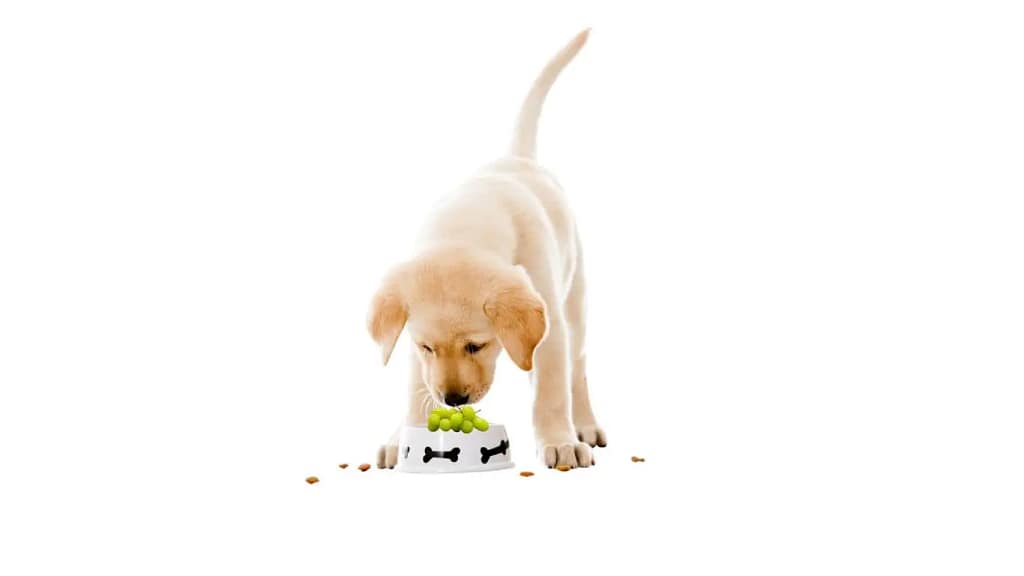If your dog has accidentally consumed grapes, or you don’t know whether grapes are best for a dog, it is important to act quickly and take the necessary steps to ensure their safety.
Grapes and raisins can be toxic to dogs and lead to serious health issues like kidney failure. It is crucial to know what to do in case of grape ingestion and how to prevent it from happening in the future. This article will discuss the signs of grape toxicity in dogs, what to do if your dog eats grapes, and how to prevent it from happening again.

Table of Contents
Toggle1. How Long After Eating Grapes Will A Dog Get Sick
Se grapes and raisins can be highly toxic to dogs, and even a tiny amount can cause severe health issues.
But generally, a dog will show grape toxicity symptoms within a few hours after eating grapes. Symptoms can include vomiting, diarrhea, abdominal pain, and dehydration. In severe cases, grape toxicity can lead to kidney failure, which can be fatal if not treated promptly.
If you suspect your dog has eaten grapes, it is essential to seek immediate veterinary attention to prevent serious health complications.
2.Why Are Grapes Toxic To Dogs?
Grapes contain a toxic compound that can cause kidney failure in dogs. Even a small amount can be dangerous and lead to vomiting, diarrhea, abdominal pain, and dehydration. In severe cases, it can lead to kidney failure, which can be fatal if not treated promptly. It is not fully understood why grapes are toxic to dogs.
Still, it is believed that the toxicity may be due to a combination of factors, such as pesticides or other chemicals on the grapes or a naturally occurring compound in the grapes themselves. like acid
3.Signs Of Grape Poisoning In Dogs
Vomiting: One of the dogs’ first signs of grape poisoning is vomiting. If your dog has consumed grapes, they may experience stomach upset and can vomit shortly after eating them.
Diarrhea: Another common symptom of grape poisoning in dogs is diarrhea. Your dog may have loose or watery stools, which can accompany stomach cramps and discomfort.
Abdominal pain: Your dog may experience abdominal pain and discomfort if it ingests grapes.
Loss of appetite: Dogs that have consumed grapes may lose their appetite and refuse to eat or drink.
Fatigue and weakness: As the grape poisoning progresses, your dog may become increasingly weak and tired. It may need help standing or walking and may seem lazy or tired.
Kidney failure: In severe cases, grape poisoning can lead to kidney failure in dogs. Symptoms of kidney failure include increased thirst, frequent urination, and dark or discolored urine.
If you suspect your dog has ingested grapes and is showing any of these symptoms, it is important to seek veterinary care immediately. The sooner your dog receives treatment, the better their chances of recovery.
4.How Many Grapes Can Hurt A Dog?
It is important to note that grapes and raisins are toxic to dogs and can cause serious health issues. Even small amounts of grapes or raisins can lead to kidney failure in dogs. It is not known exactly how many grapes are toxic to dogs, as it varies depending on the size and health of the individual dog.
However, it is best to avoid giving grapes or raisins to dogs at all, as even a small amount can cause serious harm. If you suspect your dog has consumed grapes or raisins, it is essential to seek immediate veterinary care.
5.What Is Worse For A Dog, Chocolate, Or Grapes?
Both chocolate and grapes can be toxic to dogs and should be avoided. However, chocolate is considered to be more dangerous for dogs than grapes.
Chocolate contains theobromine, which can cause vomiting, diarrhea, increased heart rate, and even death in severe cases. The darker the chocolate, the more theobromine it contains, making it more toxic to dogs.
Grapes and raisins contain an unknown toxin that can do kidney failure in dogs. Even small amounts can cause serious health problems, and the symptoms may not appear for a day or two after ingestion.
If a dog has consumed either chocolate or grapes, it is essential to seek veterinary care immediately. The veterinarian will be able to assess the dog’s condition and determine the best course of action.
In some cases, the dog may need to be hospitalized for treatment, including fluids and medications, to prevent further damage to the kidneys or other organs.
To prevent accidental ingestion, always keep chocolate and grapes out of your dog’s reach, and be sure to properly dispose of any wrappers or containers that may contain traces of these toxins.
6.What To Do If Dog Eats Grape Jelly
If your dog has accidentally ingested grape jelly, it is important to seek medical attention as soon as possible. Grape jelly contains high levels of xylitol, a sugar substitute that can be toxic to dogs if consumed in large quantities. Symptoms of xylitol toxicity include vomiting, diarrhea, loss of coordination, and even seizures.
The first step in dealing with a dog that has eaten grape jelly is to contact your vet or an emergency animal hospital. They will be able to advise you on the best course of action and may even recommend inducing vomiting to prevent the jelly from being absorbed into the dog’s system.
In the meantime, you should monitor your dog for any signs of distress or illness. If your dog is showing symptoms such as vomiting, diarrhea, or loss of coordination, it is important to keep them hydrated and provide them with a small amount of food.
7.Does Milk Help A Poisoned Dog?
Milk is often thought of as a remedy for upset stomachs, but it is unlikely to be helpful in most poisoning situations. Giving milk to pets can sometimes make things worse because most pets are lactose intolerant and unable to digest the lactose in milk properly.
When a pet ingests something toxic, its body will often try to expel it as quickly as possible. Giving milk can slow down the process, making it harder for the body to rid itself of the toxin.
Additionally, the lactose in milk can cause or worsen stomach upset symptoms such as diarrhea, vomiting, and bloating. It can make the pet feel even worse and prolong its recovery.
If your pet has ingested something toxic, The veterinarian will be able to determine the best course of treatment for your pet, which may include inducing vomiting, administering activated charcoal, or providing supportive care. In most cases, milk will not be recommended as a treatment option.
8.My Dog Ate Grapes A Week Ago. What Should I Do
Last week, my dog, a Labrador Retriever named Max, ate grapes while we were walking. At first, I didn’t think much of it as grapes are a typical food many people eat. However, I soon learned that grapes could be dangerous and even fatal to dogs.
After we returned home, I noticed that Max seemed a bit off. He was lethargic and not as interested in playing as usual. I immediately became concerned and asked my vet if grapes were safe for dogs to eat. The vet informed me that grapes and raisins could be toxic to dogs and cause severe kidney damage.I was horrified and immediately checked Max’s vomit and feces for any signs of grapes.
Thankfully, I didn’t find any, but I was still worried about the potential damage that may have already been done. I took Max to the vet for a check-up, and he was okay. The vet said he may have just had mild food poisoning but was fine and healthy overall.
9.My Dog Ate One Grape. Should I Worry
If your dog ate one grape, monitoring them closely for any signs of distress or illness is essential. Grapes, raisins, and currants can be toxic to dogs and cause kidney failure if consumed in large amounts.
It is also important to note that the toxic dose of grapes can vary greatly depending on the size and breed of your dog. Smaller dogs and breeds with a history of kidney issues may be more at risk for developing severe health problems after consuming grapes.
Symptoms of grape toxicity in dogs include vomiting, diarrhea, loss of appetite, abdominal pain, and increased thirst and urination. The dog may experience kidney failure in severe cases, leading to death if not treated promptly.
You must contact your veterinarian immediately if you notice these symptoms after your dog eats one grape. They may recommend inducing vomiting to remove any remaining grapes from the dog’s stomach and may also prescribe medication to help support the dog’s kidneys.
In the future, it is important to keep grapes and other potentially toxic foods out of your dog’s reach to prevent further incidents.
10.Can Dogs Safely Eat Grapes?
No, dogs should not eat grapes of any kind. Grapes, including red, green, purple, and seedless grapes, are all toxic to dogs and can lead to acute kidney failure. Raisins and products made from grapes, such as grape juice, are also harmful to dogs.
Eating grapes can cause symptoms such as vomiting, diarrhea, decreased appetite, and lethargy. If a dog has eaten grapes and experiences any of these symptoms,
11.Can A Single Grape Kill A Dog?
It may come as a surprise, but a single grape, or even a tiny handful, can be potentially fatal for a dog because grapes and raisins contain a toxic substance that can cause serious kidney damage in canines.
The exact cause of this toxicity is not fully understood, but it is known that even a small amount can lead to severe symptoms such as vomiting, diarrhea, and increased thirst and urination. In extreme cases, it can lead to kidney failure and even death.
12.Can Dogs Eat Seedless Grapes
Dogs can technically eat seedless grapes, but it is not recommended, as grapes and raisins have been known to cause kidney failure in dogs. Even small amounts can lead to serious health issues, so avoid giving them to your furry friend. It’s always better to be safe than so it’s best to give with dog-safe fruits such as apples or bananas.

